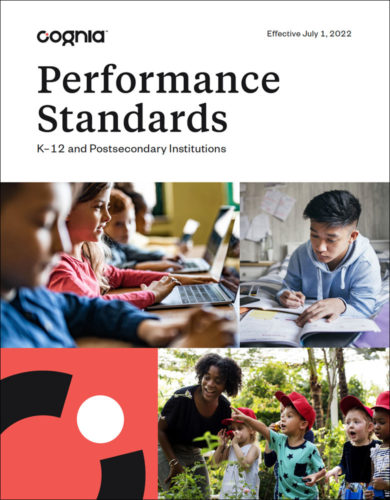As an improvement organization, Cognia believes that every institution, even great ones, can be better tomorrow than today. We hold ourselves to the same ideal. Like the members we serve, Cognia continually works to innovate and improve. Our commitment to school quality and continuous improvement compels us to examine and update our accreditation standards and protocol to acknowledge changes and set expectations for quality education institutions in a new era.
Cognia’s Performance Standards and Protocol underpin all our solutions in service to schools and learners—professional learning, accreditation and certification, assessment, turnaround, and school improvement. The accreditation standards outline expectations for Cognia accredited institutions based on what the latest education research indicates makes for quality schools. The protocol outlines the requirements of the accrediting process.
New Cognia Performance Standards and Protocol
New Cognia Performance Standards and Protocol go into effect July 1, 2022, for member institutions undergoing an Accreditation Engagement Review and institutions pursuing accreditation for the first time. These new standards will help schools address today’s education challenges and set a vision for the future. In our last edition we wrote about The Meaning of Standards but here is what is most important to know.
The new protocol includes Self-Assessment, Engagement Review, and Progress Reporting. If you are familiar with the previous Cognia standards for different institution types, you will notice a significant change. One set of standards applies to all K–12 and postsecondary institution types, including systems of institutions. Not to worry we have ways of capturing relevant details that make your institution unique, and still provide useful information that leverages the power of community to share what we know works for high-quality schooling and is relatable among institutions with similar profiles, challenges, and experiences.
Members institutions now have new improvement tools and more opportunities for support and collaboration to help your institution’s team achieve a shared vision and understanding and make progress on improvement objectives.
Starting this fall, in response to evolving institution needs Cognia will:
|
Throughout the engagement review process, Cognia provides guidance, tools, and resources as we shift from a review event to a relationship that fosters ongoing progress with momentum. With Cognia Standards as your guide to high-quality schooling you choose how to address your institution’s specific needs and leverage our knowledge to help you succeed.
Based on current research in education, input from practitioners, and multiple expert reviews, Cognia’s cyclical development process assures that the standards at the foundation of our improvement and accreditation strategies continue to be viable, feasible, and relevant. Learn more about the new Cognia Accreditation Performance Standards or reach out to your local Cognia contact for assistance.
*Some institution accreditation cycles will differ based on the needs or requirements of the institution, or the state/country in which it operates including Early Learning, Department of Defense Education Activity, and international schools.
© Cognia Inc.
This article may be republished or reproduced in accordance with The Source Copyright Policy.
The information in this article is given to the reader with the understanding that neither the author nor Cognia is in engaged in rendering any legal or business advice to the user or general public. The views, thoughts, and opinions expressed in this article belong solely to the author(s), and do not necessarily reflect the official policy or position of Cognia, the author’s employer, organization, or other group or individual.


